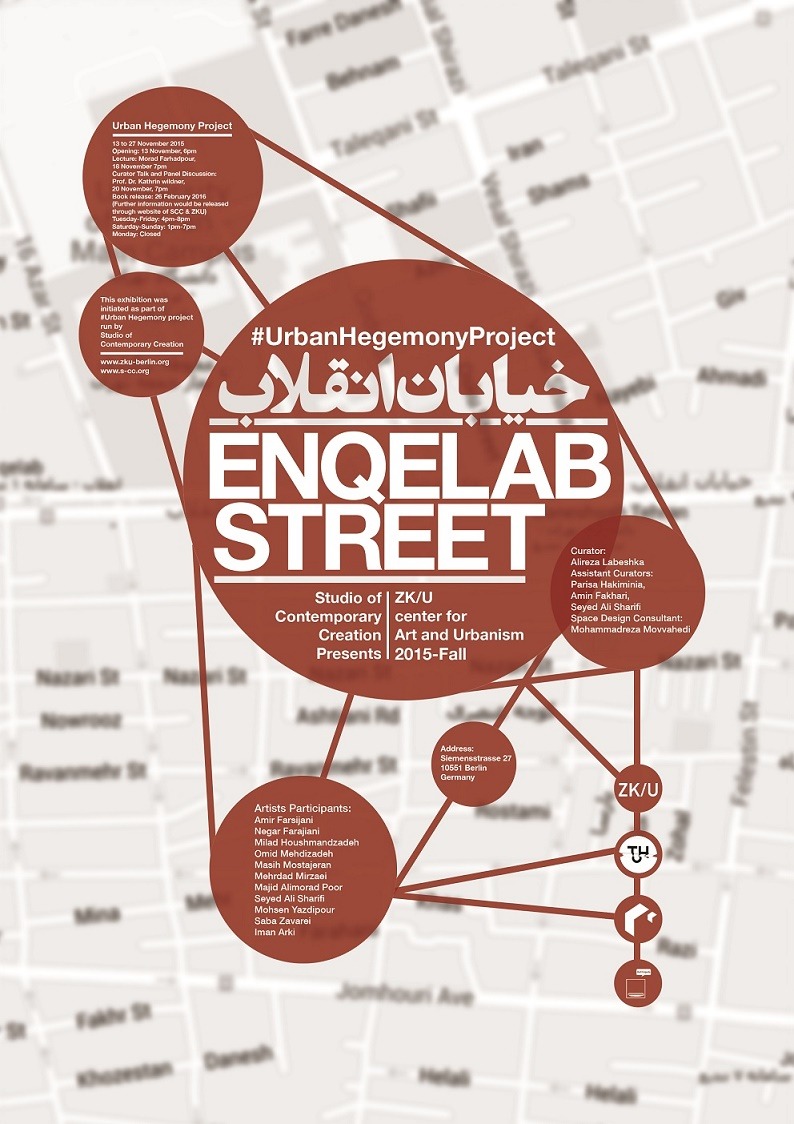Enqelab Street
Curator: Alireza Labeshka
Assistant curators: Parisa Hakiminia, Amin Fakhari
Exhibition design: Parisa Hakiminia, Mohammadreza Movvahedi
Graphic design: Shahin Rassuli
Panel discussion: Dr. Kathrin Wildner, November 20, 7pm
November 13-20, 2015
ZK/U – Zentrum für Kunst und Urbanistik
This exhibition was initiated as part of the #UrbanHegemony project run by Studio of Contemporary Creation.

Enqelab Street is the first exhibition in a series of #UrbanHegemony projects initiated by the Studio for Contemporary Creation. The #UrbanHegemony project is about the rapid urban changes in Iranian cities and the socio-political implications of these transformations. It addresses the formation processes of urban spaces that possess potential for creating new ideologies and lifestyles for citizens. The #UrbanHegemony project discusses how a city can define and subtly reconfigure the narrow borders between citizenship and non-citizenship, between order and chaos, and also between the legal and the illegal.
#UrbanHegemony begins in Tehran on one of the most important streets in the Middle East: Enqelab, which literary means “Revolution.” If we have Tahrir Square for Cario, and Taqsim Square for Istanbul, then for Tehran, we would refer to Enqelab Square (Street). For Tehran, Enqelab represents—as Asef Bayat asserts in his book Life as Politics—the “street politics of exceptional junctures, the street of discontent.” But after 2009’s presidential election, and the reaction of people on the streets and in public spaces, the municipality of Tehran configured Enqelab’s street space in such a way as to minimize the social interaction of citizens. The Enqelab Street exhibition reflects the reactions of contemporary Iranian artists Majid Alimoradpour, Iman Arki, Negar Farajiani, Amir Farsijani, Milad Hooshmandzadeh, Omid Mehdizadeh, Masih Mostajeran, Seyed Ali Sharifi, Mohsen Yazdipour and Saba Zavarei to the recent urban changes in Enqelab Street.
ZKU (Center for Art and Urbanistics)’s hosting of this first exhibition, and indeed the project itself, was made possible through the kind support of Sharestan Architecture Magazine, Kunsthochschule Weissensee Berlin and IFA.
Alireza Labeshka is a Tehran/Berlin-based curator whose main concerns are the public domain, the city’s urban transformation, and their relation to political and social issues. In addition to being an MA student of Literary Studies at Humboldt University, Berlin, he is currently working on a project called #UrbanHegemony. Alireza is the director of an independent art space called Raf Projects, which he established in 2012 in Tehran. His curating experiences compromise several projects with galleries and museums, including ZKU Berlin, WBA Wroclaw and Raster from Poland, as well as M.I.A Gallery in Seattle, USA. Besides curating more than 10 exhibitions for Iranian galleries like Raf, Sareban, S-CC and The Tehran Museum of Contemporary Art, he has written various articles, interviews, exhibition catalogs and art reviews for several art magazines, among them Golestaneh, Tandis and Mokkab, as well as a recently founded Persian online journal called KAAF. Alireza has also had the opportunity to participate in residencies at the Center for Contemporary Art, CCA Warsaw, and Aedes Berlin, in collaboration with IFA. He is the co-designer of a residency program for the KAAF Foundation in Tehran, and has invited and worked with esteemed artists like Aneta Grzeszykowska, Olaf Brzeski, and Daniel Kötter.
SCC (Studio of contemporary creation) is a space for experimentation and research about contemporary art and today’s different approaches to artistic creation.This center aims to support creative ideas, and to prepare favorable circumstances for contemporary artists to explore new fields and to expand the boundaries of today’s artistic creations.
International Residency program, Theory-Practice Research programs, artist talks and international events and shows are the core activities of this center. Studio of Contemporary Creation is based in Isfahan, Iran.


